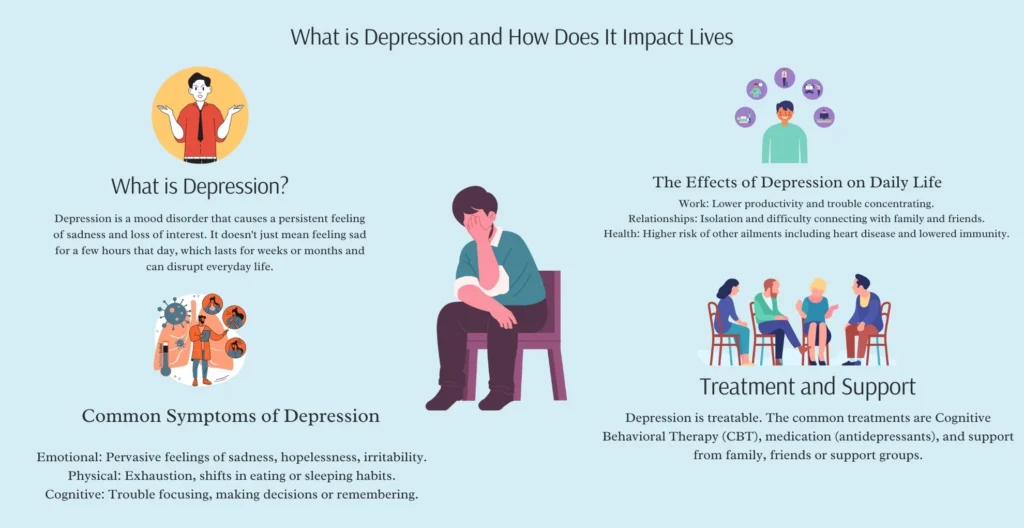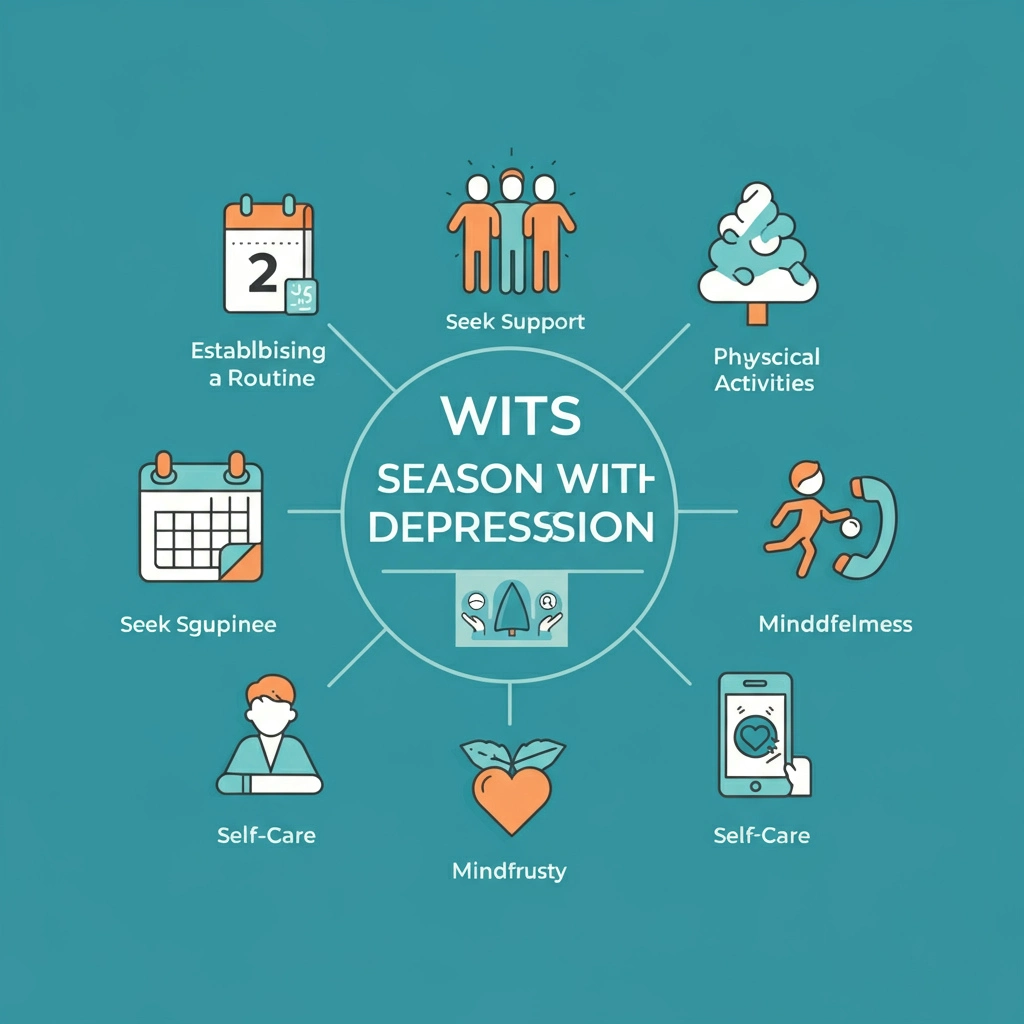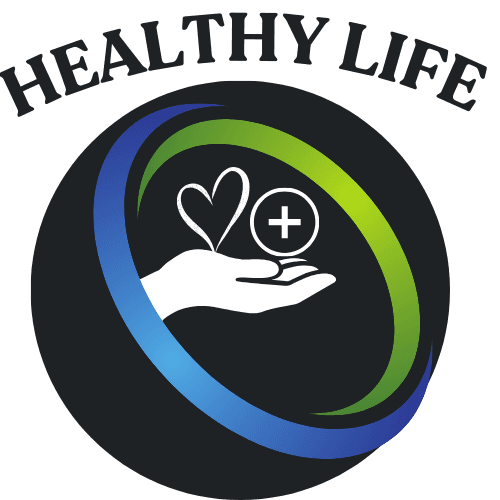Depression is a common mental health condition that impacts daily life. This guide covers its symptoms underlying causes and proven treatments including therapy medications and self-care strategies to support recovery and well-being. For many, the reality is a permanent battle with depression it permeates during waking moments and sleepless nights. It does not matter if you struggle with depression, fight for the normalization of mental health diseases, or support a loved one through tough times; understanding the nature of depression can help us communicate better about it.
What is Depression?
Depression, medically categorized as a “mood disorder,” does not manifest the same way for everyone. It takes many shapes, and every one is its own challenge.” Major Depressive Disorder is one of the most well-known, characterized by significant feelings of hopelessness, fatigue, and loss of interest in activities that once brought joy. There are other types such as Persistent Depressive Disorder (which is more chronic but less severe), Bipolar Disorder, which involves periods of mania and depressive episodes, and Atypical Depression, which ranges away from the typical because of mood reactivity and fluctuating physical responses.
For many, depression is more than an emotional condition; it is cognitive, making it hard to focus, remember, or even think logically. This invisible illness often comes hand-in-hand with mood swings, apathy, emotional dysregulation and chronic fatigue, making it a complex and isolating experience for the people who have it.
Causes and Risk Factors of Depression
Depression comes from a delicate balance of genetic, environmental, and psychological factors. There isn’t a single “cause” for why someone experiences it, but there are a number of contributors that are often seen.
Genetic and Biological Factors
The neurochemistry of our brain has a huge part to play in our mood regulation. Those with Depression often experience imbalances of neurotransmitters such as serotonin, dopamine, and norepinephrine, causing increased emotional dysregulation and stress responses. Genetics can also be a big factor; studies show depression can be familial, particularly if there’s a family history of other mental health disorders such as bipolar disorder or anxiety.
Environmental Factors
Life experiences have an enormous impact on mental health. Those who’ve experienced trauma — childhood abuse, grief, psychological trauma — are more likely to develop depression. Depressive symptoms can also become more pronounced when dealing with chronic illness — such as diabetes, heart disease or even cancer — since Physical pain exacerbates emotional pain. Outside of health, social determinants such as unemployment, inactivity or the stigma associated with talking about mental health can crush people.
The Mind-Body Connection
Depression, of course, does not make that distinction; it often preserves the borders of body and mind only to disrupt them. The link to chronic fatigue and insomnia chronic fatigue and insomnia, the role of poor Stress regulation (“stress biology”), the categorisation of pregnancy as a vitamin deficiency state — all illustrate the interplay between mental and physical health in depression.
Depression Diagnosis and treatment
How is Depression Diagnosed?

Recognizing the signs is the first step to diagnosis. Screening tests for depression, medical evaluations by Health care providers and the expertise of psychiatrists all help accurately diagnose this mood disorder. Online resources, like those at the National Institute of Mental Health can help people uncertain of whether their symptoms merit professional help.
By talking through your symptoms, triggers and medical history, a confirmed depression diagnosis can give a sense of clarity so that experts can tailor treatment to your exact needs.
Garanties de traitement pour la dépression
Recovery can often require multiple types of treatment:
- If that sounds a lot easier said than done, psychotherapy literally can help you demolish negative thinking so you won’t feel the need to be so defensive. Cognitive Behavioral Therapy (CBT), for example, identifies the root causes of your negative thoughts and feelings.
- Psychiatric medication including antidepressants and mood stabilizers — repairs imbalances in the brain’s chemistry.
- In severe cases that do not respond to other treatments, more advanced therapies such as electroconvulsive therapy and vagus nerve stimulation may be considered.
The practice of lifestyle changes such as the improvement of physical activity (exercise and depression), the creation of a diet, yoga, and sleep is highly effective.
Coping Strategies and Social Support
But coping strategies are as essential as medical care.” Enhanced social support such as family, friends or specific groups eg on psychiatry org, promotes a culture of healing. Promoting self-care practices, such as journaling, practicing relaxation techniques, or pursuing hobbies, can help re-establish a feeling of equilibrium and well-being.
And if you’re struggling with depression, know that — just like your physical health — your mental health deserves to be just as prioritized. Small acts you can take now — finding trusted therapists, contacting a national mental health resource, or exploring online therapy — go a long way to helping carry your load.
Its Suicide Prevention week and the stigma
Depression is intimately linked to suicide, with feelings of hopelessness often contributing to suicidal ideation. It’s critical to recognize danger signs — such as sudden drastic behavior changes or talk of self-harm. As friends, family and caregivers, it is important to be there and offer support. Urge open dialogue and direct those in distress toward resources such as the helplines offered by the World Health Organization or the American Psychiatric Association.
With awareness and encouragement, we can help challenge the social stigma that so often accompanies depression and potentially save lives.
Mental Health Resources and Support Networks
The strength of community is healing. National Institute for Mental Health, APA (Psychiatry. org) and other mental health resources serve as essential support systems for those affected by depression. These platforms offer essential intervention and guidance, from crisis helplines to mental health volunteer opportunities.
And look into therapeutic options, such as online programs, local support groups and professional consultations, to help you in recovery or caregiving.
A Message of Hope
Depression is not a life sentence, nor is it a measure of an individual’s worth. Recovery is always possible with mental health treatment, the access to therapists and psychiatrists, and the collective power of social connections. If you’re suffering — or know someone who is — take solace knowing you’re not alone. Through sharing this blog, we can help raise awareness, provide support, and remind everyone that the strength to combat depression is closer than they think.
What is Depression and How Does It Impact Lives?

Depression is a mental health condition that impacts millions of people worldwide The individual can also suffer live detrimental effects in their day-to-day life, when it comes to relationships and general well being.
Fundamentally speaking, depression is something more than Simply feeling sad or blue. It is an unrepressed and chronic feeling of hopelessness, hopelessness and unlike which can have a radical impact on functioning. Depression can impact the ability to work, personal relationships, self-worth, and overall health.
Depression does not discriminate based on demographic factors such as age, gender, race, or socioeconomic status. This mental health condition can happen to anyone.
Unfortunately, many deaths are due to suicide from depression. According to
- Definition of Depression
Depression is one of those mental health conditions. It is more than just moments of discouragement; it affects day-to-day existence.
- Symptoms and Causes
Symptoms include fatigue, irritability, changes in sleep or appetite, difficulty concentrating, feelings of worthlessness and physical pain with no medical cause. The causes can be complicated, rooted in genetics, brain chemistry, trauma, stress or chronic illness. Sometimes, depression comes for no apparent reason.
- Global Prevalence
Depression is one of the most prevalent mental illnesses, impacting more than 280 million people around the world, regardless of their age, culture, or background. Despite being so common, stigma often prevents those affected from discussing it, leaving sufferers to hide their pain.
- Impact on Lives
Depression derails everything in life:
Daily Living: It can suck up energy, leaving even simple tasks feeling like the impossible happened.
Relationships: Friends and family might misinterpret withdrawal, causing strained relationships.
Work: Productivity and focus slip, leading to professional challenges and feeling isolated.
- Treatment and Recovery
Getting help is important and can be life-saving. Options include:
Therapy (Cognitive Behavioral Therapy, any) for alteration of maladaptive thoughts, and development of coping skills.
Medication to correct the balance of brain chemistry.
Changes to activity level, sleep, and engagement with nature.
- Encouragement and Hope
It’s difficult, but recovery is possible. If you are depressed, you are not weak, you are not alone and you can find help. With small steps we can build a better tomorrow. Reaching out for help is a powerful first step in the direction of healing.
Navigating Seasonal Depression While Staying Sober

There is a subtle ache that comes with the changing seasons. The days shrink, daylight disappears sooner, and once bright colors fade into muted grays. For many, the period around now is like wading through a cold, never-ending fog. And when you’re grasping sobriety, that fog can feel more weighty, viscous, as if the very breath you take must beat its way out.
But you’re not alone in this. Even when it feels so lonely, so much like the world has turned inward and locked itself inside, there is a way out. It doesn’t need to feel so full of weight forever. Together, we can look for ways to uncover light — even in this dark season.
- Anchor Yourself in a Routine
There’s something comforting about a rhythm, a framework for your day, even if your mind is trying to draw you into inertia. Start small. Get up at the same time every morning, sink into the stillness of the day, even if that’s all you can muster. A warm cup of coffee, a few slow breaths by the window — these tiny rituals can foster a sense of stability in a time of uncertainty.
Jot down intentions for the day that involve simple tasks. “I will go for a walk” or “I will call one friend today.” Gradually, these anchors start pulling you down when the tide tries to wash you away.
2. Lean on Support and Don’t Fear Asking for It
You don’t have to do this by yourself. Whether it’s late-night chats with a fellow friend of Bill who also happens to be up, or a meeting or just a cup of tea with a trusted person who knows you are fighting against the darkness pulling you in, it can be a lifeline.
Sobriety support groups, whether physical or virtual, provide an arena where your struggles don’t need explaining. In there, every feeling — every wave of frustration, hopelessness or exhaustion — is met with compassion. Connection literally rebuilds the bridges that seasonal depression tries to burn, reinforcing that a community stands alongside you.
3. Keep Going, Even When It Feels Like You Can’t
Some days, just getting out of bed is like an epic feat. The weight of the season can bear down heavy, beckoning you to stay below the blankets, to settle into the quiet. But even the slightest act of movement — a stretch, a shuffle from one space to another packs a quiet punch.
If you can, step outside. Experience the sharp sting of cold air against your face or watch the sun rise shyly beyond the clouds. Exercise doesn’t need to be a grand undertaking perhaps it’s doing a yoga flow in the living room or going for a meandering stroll around your neighborhood. Each step is a testament to the fact that your body is alive and functional, and that means you are still moving forward.
4. Find Presence in Mindfulness
When sadness seems infinite, reminding yourself of the present moment can bring it down to something smaller, more tangible, more manageable. Close your eyes and focus on your breath — the rise and fall of your chest, the cool air coming in, the warm air coming out.
Or tune into your senses. Take notice of the feeling of the blanket on your skin. Inhale the faint spice of your tea. Read a book that speaks to you. These tiny acts of mindlessness have a way of grounding you, however temporarily. With each return to the here and now, you take back a little bit of power.
5. Lean Into Self-Care, Even If It Seems Unwarranted
Seasonal depression can lie to you, telling you to not take care of yourself don’t eat, don’t sleep, sink away when you need compassion most. Challenge those whispers. Give your body nourishment with warm, comforting food. Sew yourself into layers that act like armor against the cold world. Take a long shower, and let the weight wash off of you.
Sobriety, itself, is an act of self-care, and choosing it each day is an expression of your strength. But also understand that self-compassion means forgiving the tough days, when it takes all your energy just to hang in there. You’re still trying. You’re still here.
6. When It Feels Like Too Much, Seek Professional Help
Sometimes the shadows are too heavy to face alone. If seasonal depression seems to consume you ultimely, seeking professional help can be a transformative moment. In therapy, you can discuss and begin to make sense of these repeating themes in your hardships and develop coping mechanisms. A doctor may know, if necessary, exactly what your body and mind’s needs are, in order to restore balance.
There is no shame in asking for help. To ask for it is some kind of deep strength, a massage of your own promises to your own self.
7. Celebrate the Small Victories
Sobriety and mental health are daily — sometimes hourly — battles. And each time you do keep going in the face of the old voices calling you back to old habits or discounting your progress, you win.
Some victories may seem small — a day without intrusive thoughts, a moment laughing in the heaviness — but are no less significant. Lean into those moments. Let them serve as a reminder of your strength.
8. Hold Space for Yourself
Not all days will feel hopeful. You will wonder if it was worth it at all, if your light will ever return. It’s okay to feel that. Cry if you need to. Scream into the pillow. Even if the words don’t come out probably write your feelings into a journal.
But also remind yourself that this storm has an end date. All seasons come to an end, even the bitterest and loneliest ones. And so this, too, shall pass, even if the road seems long.
You are not your struggles but rather your determination to confront them each day. Every little step forward is a testament to your strength. You are doing the difficult labor of healing, and that is a victory no winter can steal from you.
Take care. You are not alone in this, even in a world that seems to be lost to silence. Keep seeking the light—even if it seems far away—and believe you’ll find it again.
How to Think Positive When Depressed

Give Yourself Some Grace: Care for yourself during hard times. Validate that depression is real, that emotions like yours are normal. Use the same understanding and compassion you would give to a loved one.
Focus on the Present Moment:Try to be present instead of reading and crying over the past or worrying about the future. Do things that make you happy or feel calm. Set aside time for mindfulness or meditation practices that can aid in bringing your awareness to the present.
Challenge Negative Thoughts: Depression usually brings negative thoughts with it, and these can create an downward spiral. Recognize the thoughts and counter them with something more perspective and positive. Reframe self-critical thoughts as self-affirming ones. Just a word of reminder, your worth is not determined by your thoughts.
Seek Support: Talk to trusted friends, family members, or a mental health professional who can offer reassurance or guidance. Sharing how you feel and what you have been going through can relieve the weight of depression, and help you see things differently.
Leverage Meaning and Purpose: Get a hobby or activities that gives you meaning or fulfillment. Finding meaning in your life can shift your focus to the positive and gives you some sense of accomplishment, whether it’s through volunteering, pursuing creative endeavors or helping others.
Keep a Gratitude Journel: Cultivate a gratitude practice by regularly reflecting on things you are grateful for. It can refocus your mindset on the nice things you have in life and fight the negative emotions that depression induces.
Stay Physically Healthy: Get regular exercise, eat healthy meals, and get enough sleep. Mental well being can be so interconnected with physical well-being. Nourishing your body can help bring up your mood and general focus.
Because if you’re depressed, thinking positively can be difficult, but not impossible. Just take your time, be gentle to yourself and celebrate small wins. Even if you’re feeling the effects of depression, with time, support, and self-care, you can develop a more positive mindset.

